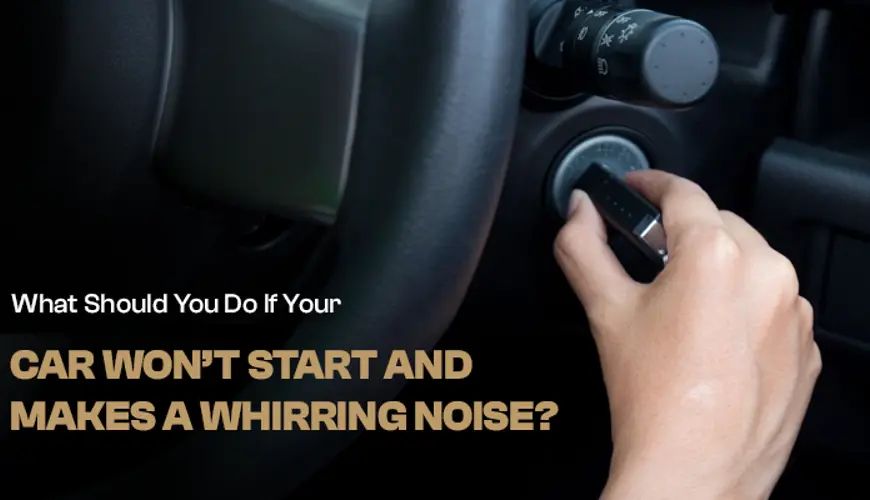When your car makes a whirring noise but won’t start, it’s often a sign that a part of the starting system isn’t functioning correctly. Experienced mechanics across Melbourne often diagnose this problem during routine inspections, especially in cars that are overdue for servicing or show early signs of wear. Melbourne’s changing weather conditions, combined with frequent stop-start city driving, can place extra strain on your car’s electrical and mechanical systems, making timely maintenance even more important.
At BCS Prestige, we use advanced computer diagnostic systems to quickly identify starting issues, from starter motors and batteries to alternators.
Car won't start? Call us at (03) 9501 0010
In this blog, we’ll break down what the whirring noise usually means, what causes it, and why booking a car repair in Melbourne can help you avoid major problems in the future.
What Does a Whirring Sound Mean?
A whirring sound in car start-up situations generally indicates an issue with the starter motor, flywheel, or engine timing system. during start-up generally indicates an issue with the starter motor, flywheel, or engine timing system. Unlike a clicking or rattling sound, a whirring noise often suggests that a component is spinning freely without effective engagement. This lack of engagement can prevent the engine from starting and may point to a malfunction in an important part of the starting system.
Here are some possibilities of your car not starting and making a whirring sound:
- The starter motor is spinning, but the flywheel isn’t engaging.
- The battery is too weak to crank the engine fully.
- The timing belt or chain may be broken or loose.
- There’s internal engine damage causing free-spinning.
These faults can lead to a complete failure to start the engine. If your car makes a whirring noise but won’t start, it is recommended to avoid repeatedly turning the key or pushing the start button. Continuing to crank the engine can cause further damage and lead to more costly repairs.
What are the common reasons your car makes a whirring noise but won’t start?
Below are the most common reasons behind the whirring sound when starting your car:
1. Faulty Starter Motor
The starter motor is responsible for turning the engine over to initiate combustion. If the internal gear within the starter spins without engaging the engine’s flywheel, it produces a whirring sound. In such cases, the engine fails to start due to the lack of a mechanical connection required to crank it.
Recommendation: This component needs to be inspected and, if necessary, replaced. Repeatedly trying to start the engine won’t resolve the issue and may cause further damage.
2. Weak or Flat Battery
A weak battery might power lights and electronics, but still lack the strength to start the engine. A weird noise when starting the car is often the first noticeable symptom that leads mechanics to investigate the battery as the root cause. Especially after 2 to 3 years or around 50,000 km, battery performance becomes less effective.
Recommendation: A diagnostic battery test can determine whether the issue lies with a low charge or a failing battery, allowing for a replacement or recharge if needed.
To understand the long-term benefits, read our detailed guide on why regular battery testing is essential for European cars.
3. Damaged Flywheel Teeth
The flywheel interfaces with the starter gear to initiate engine rotation. If the flywheel’s teeth are worn, stripped, or damaged, the starter may spin freely without engaging the engine, preventing it from starting.
Recommendation: Repairing or replacing the flywheel is essential, especially if your car has covered 100,000 km.
4. Broken Timing Belt or Chain
If your engine is equipped with a timing belt and it fails, the pistons and valves fall out of sync. As a result, the engine will not crank normally; Instead, you'll hear a free-spinning whirring noise in car start attempts, indicating that the internal components are no longer working in sync.
Recommendation: It’s important not to overlook your car’s recommended timing belt replacement intervals. Most manufacturers recommend replacement between 80,000 and 100,000 km. Even minor warning signs shouldn’t be ignored. Scheduling a timely inspection and addressing issues early by considering car repair service can help prevent minor faults from escalating into major, costly repairs.
What are the warning signs you shouldn't ignore?
If your car is not starting and you hear a whirring noise, avoid forcing it. Doing so can escalate a minor starter-related issue into a major and potentially costly engine repair.
Other signs that can help you determine the cause of the whirring noise and starting issue include:
- Dashboard lights flickering or dimming
- Whirring followed by silence
- Engine light on
- Occasionally starts after multiple attempts.
If you're experiencing any of these signs, it's recommended to schedule an inspection.
Tips to prevent starting issues in the future
After your car has been repaired, here are a few simple steps to help prevent future starting issues:
- Replace your battery every 3–4 years, or earlier if it shows signs of wear.
- Service your starter system during major services (typically every 50,000 to 60,000 km).
- Replace timing belts at the manufacturer-recommended intervals (usually 90,000–100,000 km).
- Listen for unusual car noises, and don’t delay service if something sounds off.
- Use your car regularly, Long periods of inactivity can drain batteries and stiffen parts.
Regular servicing from an experienced car mechanic near you is essential, especially for European cars, which rely on advanced electronics and precision-engineered components to perform optimally.
For a detailed overview of what this involves, read our blog about the Complete Guide to Full Car Servicing & Maintenance.
Why choose BCS Prestige for car repair in Melbourne?
At BCS Prestige, we have extensive experience working with European cars. We've helped Melbourne car owners with a range of issues, including whirring noises, no-start conditions, and electrical faults.
When you bring your car to us, we:
-> Perform a full diagnostic
-> Check the battery, starter, and ignition system
-> Inspect belts, flywheel, and timing components
-> Offer straightforward recommendations
We help car owners resolve starting issues efficiently and clearly, without confusion or unnecessary delays. Whether it’s a no-start issue or unexpected noise, our team will thoroughly inspect and repair the problem using effective methods and experienced hands.
Take Away
If your car isn’t starting and you hear a whirring noise, it’s a clear sign that something isn’t functioning correctly. Whether the issue lies with the battery, starter motor, flywheel, or internal engine components, it’s not something to ignore or attempt to fix without diagnosis from an experienced mechanic.
Quick Summary:
-
A whirring sound during startup usually points to a failed starter, flywheel issue, or timing failure.
-
Any noise when starting the car that sounds unusual should be investigated promptly by a professional.
-
Attempting to start it repeatedly can cause more damage.
-
Battery and starter issues are more common past 50,000–100,000 km.
-
You need a reliable workshop with the manufacturer-approved tools and experience.
If you are looking for car repair near you, call now or book online to schedule your inspection with our experienced mechanics.
Frequently Asked Questions
Q: What are the most common causes of a whirring sound when starting a car?
A: The most common causes include a weak or dead battery, a faulty starter motor, damaged flywheel teeth, or a broken timing belt/chain. Each of these can prevent the engine from starting efficiently.
Q: Could a bad battery or starter motor be the reason my car won’t start?
A: Yes, a weak battery may fail to supply enough power to start the engine, while a faulty starter motor can spin freely without engaging the engine, leading to a continuous whirring sound.
Q: What should I do if my car won’t start but makes a whirring noise?
A: Avoid repeatedly trying to start the car, as this may cause further damage. Instead, schedule an inspection with an experienced mechanic at BCS Prestige to diagnose and fix the issue safely.
Q: How can I prevent my car from having starting problems in the future?
A: Regular servicing, changing the battery when needed, and checking the starter and engine belts can help prevent your car from having starting problems. Fixing unusual noises early can also prevent significant issues.

















